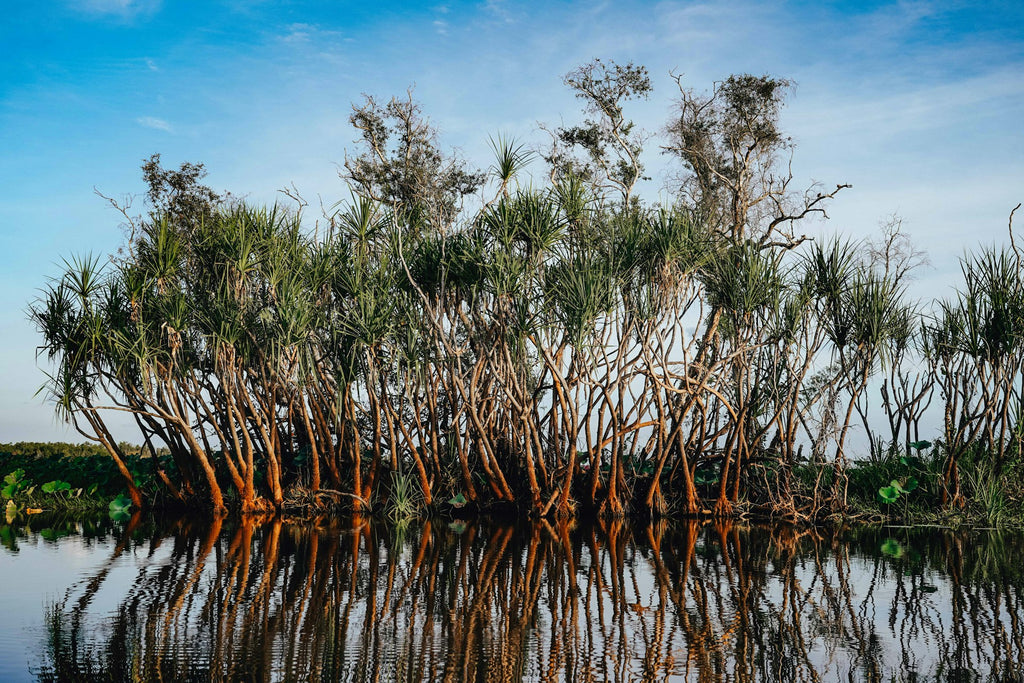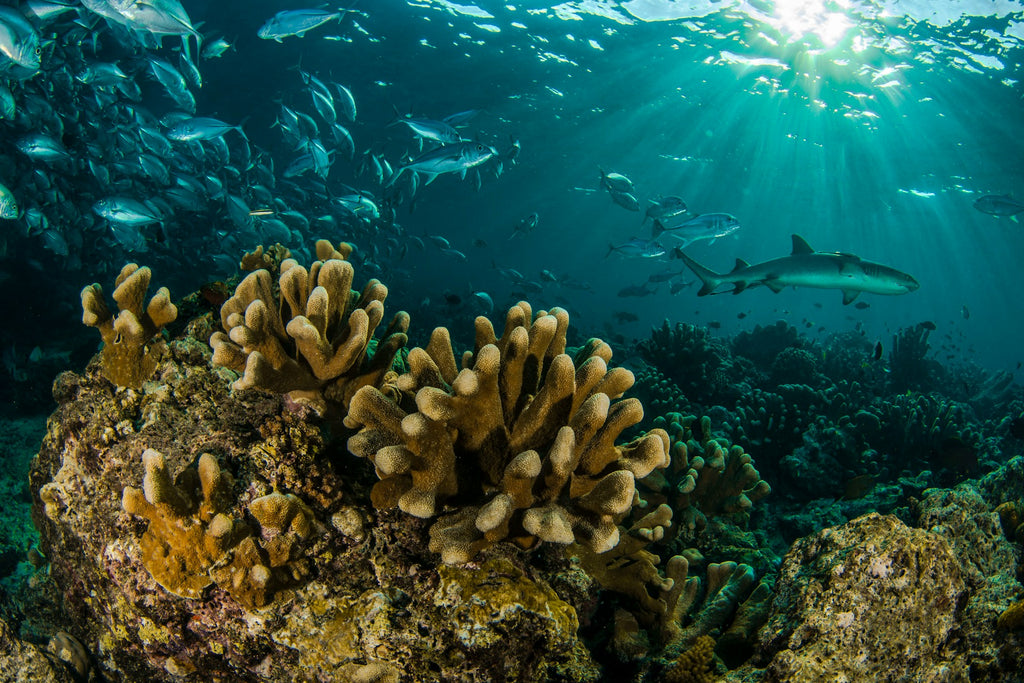From the depths of our hearts, we extend a profound thank you to all Koraru customers. Your unwavering support throughout 2023 has made a significant difference for coral reef conservation. Each purchase you've made hasn't just been a valuable addition to your closet but also contributed to a cause much greater than ourselves.
In this article, we delve into the 2023 Coral Reef Impact Report released by the Coral Alliance. Recognized as a dedicated non-profit organization focused on the protection of coral reefs, their relentless efforts toward conserving our planet's underwater ecosystems have been inspiring and impactful. Through this report, they shed light on the crucial issues surrounding these vibrant ecosystems and outline initiatives that are making a tangible difference.
We took a look at the report and we would like to invite you to join us as we journey through their work in 2023. We'll explore key findings that underline the importance of coral reef conservation, discuss various initiatives that are paving a path toward healthier oceans, and illustrate how your purchases from KŌRARU have played a part in this grand scheme.
Every step we take, every change we make, begins with knowledge and understanding. Let's dive in together and discover what lies beneath the surface in the 2023 Coral Reef Impact Report.
THE IMPORTANCE OF CORAL REEF CONSERVATION
Coral reefs are incredibly important for both the environment and the economy. Here's why we need to protect them:
BIODIVERSITY
Each coral reef is a complex ecosystem with many different species living together. By conserving coral reefs, we can ensure that this biodiversity continues to thrive. This is important because:
- Every species has a role to play in the ecosystem, and losing one can have ripple effects on the entire system.
- Some of these species may hold valuable information for medical research or other scientific discoveries.
- All species deserve the chance to survive and thrive.
ECONOMIC BENEFITS
Coral reefs also provide significant economic benefits, particularly in the fishing and tourism industries:
- Fishing: Many communities rely on coral reefs for their food and livelihoods. Healthy reefs mean abundant fish populations, which can support sustainable fishing practices.
- Tourism: Coral reefs are popular tourist destinations, attracting millions of visitors each year. These tourists contribute to local economies through activities like snorkeling, diving, and boating.

Image by phaisalphotos maldivesphotographer on Unsplash
CURRENT THREATS
Unfortunately, coral reefs are facing numerous threats that are putting them at risk:
- Climate Change: Rising temperatures and ocean acidification due to climate change are causing coral bleaching events, where corals lose their vibrant colors and become more susceptible to disease.
- Pollution: Runoff from land, plastic waste, and overfishing all contribute to pollution in the oceans, which can harm coral reefs and other marine life.
- Destructive Practices: Some fishing methods, such as using dynamite or cyanide, can directly damage coral reefs.
These threats are urgent and require immediate action to protect coral reefs from further harm.
"The urgency for coral reef conservation cannot be overstated; protecting these underwater treasures equates to safeguarding our planet's marine biodiversity and securing economic stability for future generations."
KEY FINDINGS FROM THE 2023 CORAL REEF IMPACT REPORT
The 2023 Coral Reef Impact Report is an analysis of the state of coral reefs around the world. It contains important information that highlights the need for immediate action to protect these fragile ecosystems. Here are the main findings from the report:
1. DECLINING REEF HEALTH
The report shows that coral cover has been decreasing in many areas, which is a clear sign of habitat loss and a decline in marine biodiversity.
2. BLEACHING EVENTS
Rising water temperatures have led to widespread coral bleaching, with some reefs experiencing severe episodes where more than half of the coral is affected.
3. POLLUTION IMPACT
There has been an increase in pollutants, such as plastics and agricultural chemicals, that are harming corals and making it harder for them to recover from stressors like bleaching.
4. SPECIES AT RISK
The list of endangered species has grown, including several types of corals that are essential for maintaining a healthy ecosystem.
5. ECONOMIC IMPLICATIONS
The report also highlights the economic impact of coral reef degradation, with potential losses in tourism revenue, fisheries productivity, and coastal protection services amounting to billions of dollars.
These findings should serve as a wake-up call for everyone. They demonstrate not only how delicate coral ecosystems are but also how our actions are directly affecting them. The Coral Alliance is committed to reversing these trends through targeted initiatives that address each of the challenges identified in the report. In the next section, we will explore these conservation strategies in detail.
1. CLEAN WATER INITIATIVES FOR CORAL REEF HEALTH
Ensuring pristine water conditions is paramount for the vitality of coral reefs, and this emphasis has steered the Coral Alliance's actions towards impactful clean water initiatives. The emphasis on clean water underscores the necessity of maintaining an environment where corals can thrive without the threat of contaminants. The Report highlights several projects that have made strides in preserving coral reef health:
TARGETED WATER QUALITY MONITORING
Deploying advanced sensors and volunteer divers to assess and record water clarity, nutrient levels, and pollutants, Coral.org has gathered crucial data to inform further conservation actions.
POLLUTION REDUCTION CAMPAIGNS
Addressing land-based sources of pollution, such as agricultural runoff and sewage, by collaborating with local communities and authorities to implement sustainable practices.
CORAL RESTORATION EFFORTS
Facilitating growth of resilient coral species in nurseries before transplanting them into degraded areas, enhancing their chance of survival in a purified aquatic habitat.
Through these concerted efforts, the Coral Alliance remains at the forefront in mitigating the adverse effects of pollution on delicate marine ecosystems. By fostering an alliance between science-based strategies and community engagement, they ensure that water quality improvement is not just a goal but a tangible reality for coral reefs.
2. PROMOTING SUSTAINABLE FISHERIES FOR LONG-TERM RESILIENCE
The Coral Alliance strongly supports sustainable fisheries as a way to protect the diverse marine life that makes up coral reef ecosystems. Overfishing is a serious issue that can destroy not only the delicate balance of marine life in these reefs but also the communities that depend on them for food and income.
To address this urgent problem, the Coral Alliance has taken action to control overfishing:
- Community Education: They have organized programs to educate local communities about the harmful effects of overfishing and the importance of sustainable fishing methods.
- Advocacy for Policies: They have pushed for policies that limit destructive fishing techniques such as bottom trawling, which can cause extensive harm to coral reefs.
- Establishment of Marine Protected Areas: The Coral Alliance has also focused on creating marine protected areas (MPAs) - specific zones where marine life can reproduce and thrive without human disturbance. These MPAs are vital in keeping fish populations at healthy levels and providing sanctuary for endangered coral reef habitats.
By combining these efforts, Coral.org aims to ensure the strength and endurance of both our marine ecosystems and coastal communities. Their work highlights the close connection between human actions and environmental well-being, reminding us that responsible practices today lead to flourishing ecosystems tomorrow.
3. BUILDING RESILIENT COASTAL COMMUNITIES IN THE FACE OF CLIMATE CHANGE
Coastal community resilience and climate change impacts are top priorities for the Coral Alliance.One crucial way we address these concerns is by helping coastal communities adapt to climate change threats.
MANGROVE RESTORATION: NATURE'S SHIELD
A key strategy we employ is mangrove restoration. Mangroves serve as natural barriers against storm surges and rising sea levels, shielding coastal communities from the destructive effects of extreme weather events. By replanting and safeguarding these vital ecosystems, we assist in constructing a defense line against the encroaching seas.

Image is for reference purposes only. Image by Rod Long on Unsplash
RISK REDUCTION PLANNING: PREPARING FOR THE WORST
Another essential aspect of our work is risk reduction planning. We collaborate closely with local communities to identify potential dangers and implement measures to minimize their impact. This can include reinforcing infrastructure to withstand severe weather conditions or establishing early warning systems for approaching disasters.
SUPPORTING COMMUNITY RESILIENCE: PROTECTING PEOPLE AND REEFS
Our efforts to support community resilience extend beyond immediate survival; they aim to ensure a sustainable future for both people and coral reefs. Coastal communities worldwide rely heavily on coral reefs - for sustenance, livelihoods, tourism, and more. A resilient community can better withstand climate-related disturbances while safeguarding these invaluable ecosystems.
The task ahead is challenging but not impossible. By joining forces across all sectors - individuals, businesses like Koraru, conservation organizations like Coral Alliance, and governments - we can empower coastal communities to confront climate change head-on while preserving our precious coral reefs.
4. LEVERAGING SCIENCE AND INNOVATION FOR EFFECTIVE CONSERVATION STRATEGIES
The Coral Alliance is a leader in using climate adaptation science to develop effective coral reef conservation plans. They combine scientific research with innovative technology to address the challenges faced by vulnerable reefs.
AUTONOMOUS UNDERWATER VEHICLES FOR MAPPING AND MONITORING
One of their advanced projects is the use of autonomous underwater vehicles (AUVs) to map and monitor coral reefs with extreme precision and speed. This data-focused approach helps identify early signs of reef damage, enabling quick action and better decision-making.
3D PRINTING TECHNOLOGY FOR CREATING ARTIFICIAL REEFS
Another impressive initiative involves the use of 3D printing technology to construct artificial structures that resemble natural reefs. These structures not only provide habitat for marine life but also enhance reef resilience against environmental changes.
BREEDING SUPER CORALS FOR CLIMATE RESILIENCE
Additionally, the Alliance's research labs are studying super corals - species that have demonstrated resistance to rising sea temperatures and acidity levels. By uncovering the genetic characteristics that make these corals resilient, scientists aim to increase the survival rate of coral populations affected by climate change.
Through these innovative approaches, the Coral Alliance strives to bridge the gap between advanced solutions and practical conservation actions. Their goal is not just to minimize harm but also to equip reefs with the necessary tools for survival in a dynamic environment.

THE POWER OF FASHION AS A CATALYST FOR CHANGE
In the world of coral reef conservation, the fashion industry has a special role to play. Specifically, sustainable brands have the ability to create positive environmental impacts that go beyond just financial support.
THE INFLUENCE OF FASHION
The fashion industry has a wide reach and significant influence, which means it has the power to shape public opinion and behavior. This is especially true when it comes to promoting ethically-made products. When consumers become more aware of how their clothes are produced, they are more likely to demand transparency, sustainability, and fair labor practices from brands.
HOW KORARU MAKES A DIFFERENCE
KŌRARU is an example of a brand that combines fashion with eco-consciousness. For every swimsuit or bikini our customers purchase, we donate $5 to the Coral Alliance's conservation efforts. This financial support is important, but KŌRARU goes beyond just money. We also use our sustainable swimwear as a way to tell an environmental story.
THE IMPACT OF KŌRARU AND BRANDS LIKE IT
When customers wear KŌRARU's sustainable swimwear, they are not just wearing a stylish piece of clothing. They are also showing their support for conscious consumption and directly contributing to the protection of coral reefs. This combination of fashion and sustainability is what makes sustainable fashion brands like KŌRARU so powerful in driving change.
In conclusion, by choosing to buy from brands like Koraru, consumers are making a statement about their values and actively participating in efforts to preserve our planet's coral reefs.
SUPPORTING SUSTAINABLE FASHION FOR A BETTER FUTURE
Making conscious, sustainable fashion choices is not just a trend - it's a lifestyle change with far-reaching impacts. Consider the ripple effect when you choose to support brands like Koraru that seamlessly blend style with sustainability. Every swimsuit or bikini purchased contributes to the preservation of our precious coral reefs.
In your journey towards making more sustainable fashion choices, here are some practical tips:
- Educate Yourself: Understand the environmental impact of your fashion habits and the difference between fast fashion and sustainable fashion.
- Quality Over Quantity: Invest in high-quality pieces that last longer, reducing the need for frequent replacements.
- Support Ethical Brands: Choose brands, like Koraru, that prioritize ethical sourcing and production methods and give back to environmental causes.
- Recycle and Upcycle: Extend the life of your clothes by donating, swapping, or reinventing them instead of discarding.
While choosing sustainable products is a step in the right direction, there are other ways to contribute. By learning about the work of organizations like Coral Alliance, you can deepen your understanding of coral reef conservation efforts. Donations offer direct support for their mission and help safeguard these vital ecosystems for future generations.
The act of supporting sustainable fashion is double-fold - not only are you embracing styles that inspire confidence, but you're also contributing to a cause that ensures the survival of our planet's biodiversity. Each choice counts towards a better future.
CONCLUSION
The 2023 Coral Reef Impact Report issued by the Coral Alliance highlights the complex challenges that affect our invaluable coral reef ecosystems. But it also shows us a way forward — one that requires action from everyone.
COLLECTIVE ACTION IS ESSENTIAL
Protecting our coral reefs requires:
- Individuals making conscious choices
- Businesses prioritizing sustainability
- Organizations leading conservation efforts
These elements are all interconnected and rely on each other for strength.
YOUR CHOICE MATTERS
When you choose a sustainable fashion brand like KŌRARU, you're not just picking out clothes. You're supporting:
- The environment
- Important research
- The preservation of marine life
Every purchase pushes the fashion industry towards more ethical practices and sends a clear message — style doesn't have to harm our planet.
THANK YOU FOR YOUR SUPPORT
To all our customers who have joined us in this journey towards sustainable fashion and coral reef conservation, we want to say thank you. Your support has made a real impact in protecting these irreplaceable ecosystems.
Together, we have started building a future where both fashion and our reefs can thrive sustainably.
THE WORK CONTINUES
The journey to save our coral reefs is far from finished. But with your ongoing support and unwavering dedication, we can look ahead to better days for these underwater wonders and for the generations to come.
Read the 2023 Coral Reef Impact Report here.





